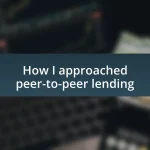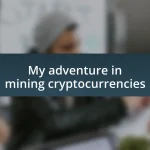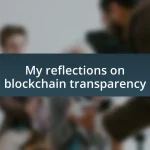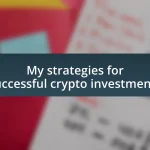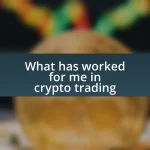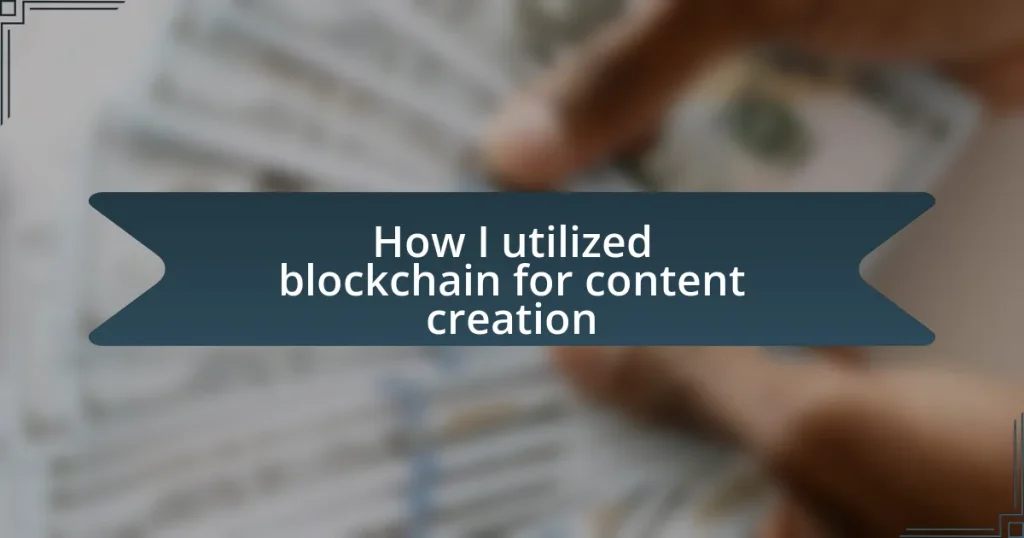Key takeaways:
- Blockchain technology empowers creators with ownership verification, transparency, and direct monetization opportunities.
- Smart contracts are vital for fair compensation and trust between creators and collaborators.
- Successful projects, such as NFT platforms and collaborative writing, demonstrate blockchain’s potential to transform creative industries.
- Future trends include decentralized platforms, tokenization for fan engagement, and AI integration for enhanced content management.

Introduction to blockchain technology
Blockchain technology, often hailed as revolutionary, is essentially a decentralized and distributed digital ledger that records transactions across many computers. I first encountered blockchain in a tech seminar, and I was captivated by the idea of unchangeable records. It made me wonder—what if we could apply this technology beyond cryptocurrencies?
As I delved deeper, I began to appreciate how blockchain enhances transparency and security, qualities I value greatly in a digital age rife with misinformation. During my research, I stumbled upon a case where artists protected their intellectual property using blockchain, which helped me realize just how transformative this technology could be for content creators like me. How many creatives struggle with copyright issues? The thought struck me as I contemplated my own challenges.
Ultimately, blockchain’s potential extends far beyond financial transactions; it’s about trust and ownership in a digital landscape. I recall the first time I experimented with a blockchain-based platform for sharing my work. The reassurance of knowing that my creations were securely recorded made me feel empowered. Could this technology be the key to unlocking new possibilities in the world of content creation? The more I explored, the more convinced I became.
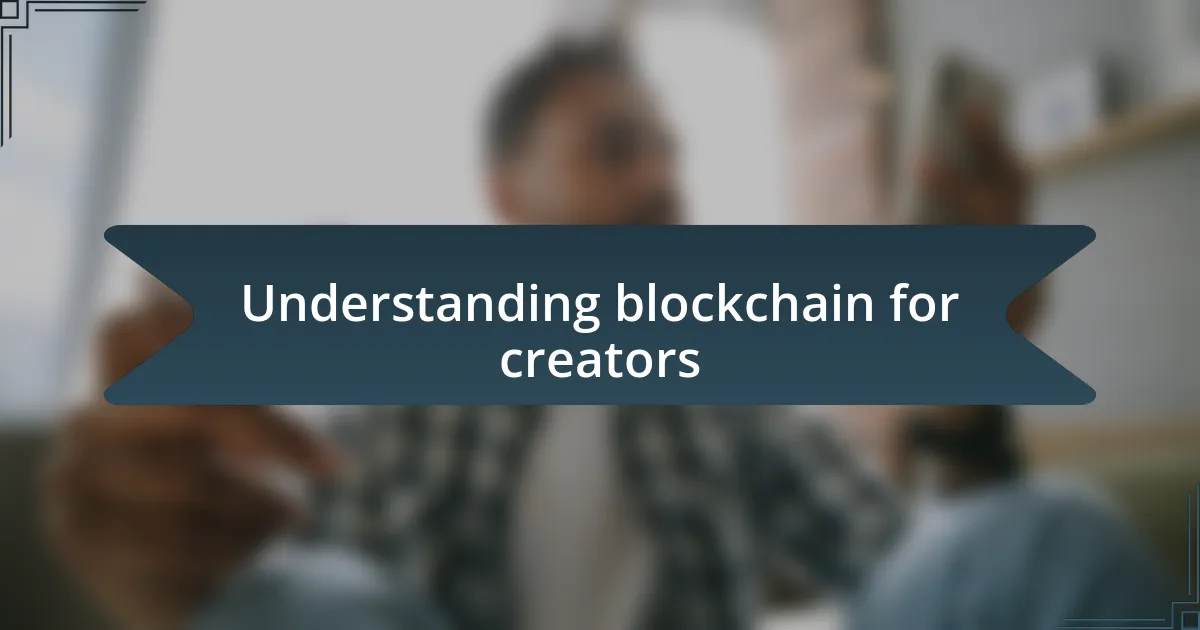
Understanding blockchain for creators
Blockchain technology offers creators a new way to safeguard their work while providing opportunities for direct engagement with their audience. I remember the first time I realized that through blockchain, I could not only claim ownership of my content but also track its distribution. It was a game-changer for me, as I felt a newfound connection to those who appreciated my work, knowing there was an unbreakable chain verifying its authenticity.
Here are some key points to consider about blockchain for creators:
- Decentralization: Your work is not controlled by a single entity, reducing the risk of censorship.
- Transparency: All transactions are publicly recorded, which builds trust with your audience.
- Smart Contracts: These self-executing contracts automate royalties and payments, ensuring you get compensated fairly.
- Ownership Verification: You can prove ownership of your content easily, providing legal protection against theft.
- Direct Monetization: Creators can sell their work directly to consumers, bypassing traditional platforms that take significant cuts.
As I explored these features, I began to envision a world where I had more control over my creative journey, and that notion felt both exhilarating and empowering.
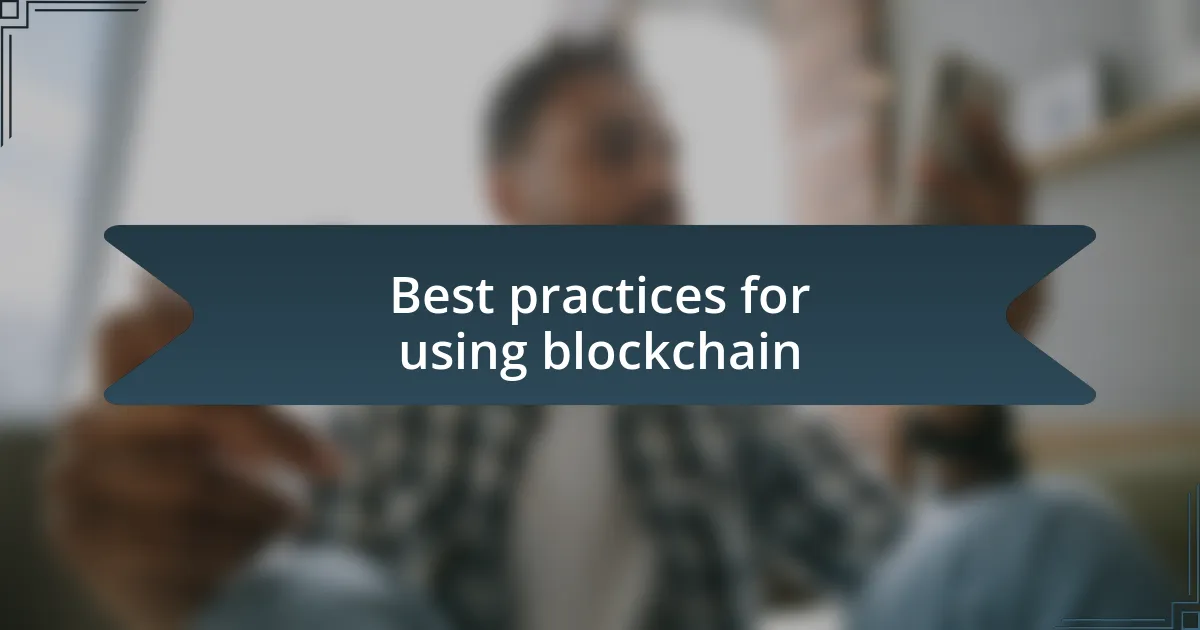
Best practices for using blockchain
When utilizing blockchain for content creation, it’s vital to be aware of the importance of choosing the right platform. I personally experienced this when I migrated some of my work to a platform that specifically catered to my niche. This choice not only enhanced visibility but also connected me with a community that truly valued my content, reinforcing the significance of finding the right audience.
Another best practice is understanding the intricacies of smart contracts. There was a moment when a project I initiated fell flat due to poorly defined contract terms. After revisiting and refining my contracts, I ensured they were clear and included fair compensation structures. This not only protected my interests but also built stronger relationships with collaborators who appreciated the transparency.
Security cannot be overstated when working with blockchain. I’ve had moments of panic when I realized how critical it is to safeguard private keys and sensitive information. Using secure wallets and two-factor authentication became non-negotiable practices for me, promoting a sense of peace as I created and shared my work without fear of unauthorized access.
| Best Practice | Description |
|---|---|
| Choose the Right Platform | Select a blockchain platform that aligns with your content and audience needs. |
| Understand Smart Contracts | Clearly define terms and compensation to build trust and protect your interests. |
| Ensure Security | Implement robust security measures to safeguard your private information and content. |

Case studies of successful projects
One remarkable case study that stands out in my experience is the project done by a group of artists on the Ethereum blockchain. They decided to create a decentralized platform for selling digital art. I watched the creators launch their own non-fungible tokens (NFTs) to monetize their work directly. This not only maximized their earnings but also empowered them to maintain ownership rights, which was a game-changer in the art world.
Another inspirational project involved a collaborative writing platform using blockchain technology to ensure authors received proper credits and payouts for their contributions. I recall seeing how this initiative attracted numerous writers eager to connect with like-minded individuals, all while securing their intellectual property rights. It made me realize how blockchain can fundamentally reshape the relationship between creators and their audience, fostering transparency and trust.
There’s also a powerful instance of a news organization employing blockchain to combat misinformation. By tracking content origins through a decentralized ledger, they assured readers of the authenticity of their articles. This case truly resonated with me, as it showcased how technology can not only enhance credibility but also revive trust in media. Isn’t it fascinating how innovative use of blockchain can lead to real-world change?

Future trends in blockchain content
As I look ahead, one trend that excites me is the increasing adoption of decentralized content platforms, allowing creators to bypass traditional gatekeepers. Imagine a world where artists and writers have direct access to their audiences, eliminating the middleman. I’ve always believed in the power of direct communication, and blockchain can truly facilitate those connections.
Moreover, the rise of tokenization in content creation can’t be overlooked. I often wonder how fan engagement can transform with token-based incentives. For instance, creators might offer exclusive perks to loyal supporters, creating a sense of community that I believe enriches the content experience. This could lead to a dynamic where fans not only consume content but also participate actively in its creation.
Another fascinating prospect is the integration of artificial intelligence with blockchain for content management. When I think about the efficiencies that could arise from such a combination, it gets me genuinely excited. For instance, AI might curate content while blockchain ensures that every piece of information is verifiable and traceable. This blend could not only enhance the quality of the content but also streamline the way we interact with it in the future. How incredible would it be to explore this new frontier together?

